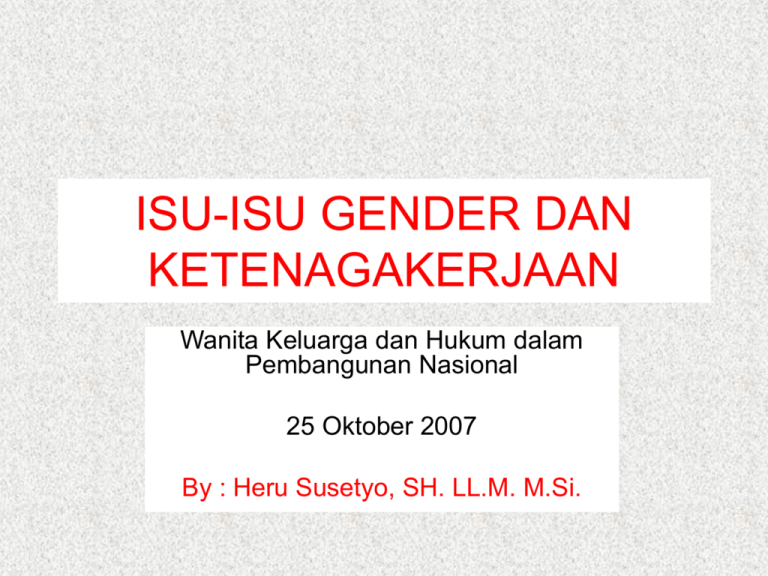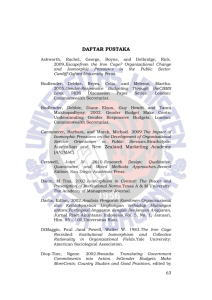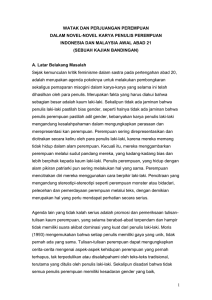perempuan indonesia dan hak asasi manusia
advertisement

ISU-ISU GENDER DAN KETENAGAKERJAAN Wanita Keluarga dan Hukum dalam Pembangunan Nasional 25 Oktober 2007 By : Heru Susetyo, SH. LL.M. M.Si. Masalah perempuan di wilayah ketenagakerjaan • • • • • • Diskriminasi pengupahan Diskriminasi usia pensiun Unequal opportunity Kesehatan dan keselamatan kerja Hak-hak normatif Pekerja sektor informal (incl. Pembantu rumah tangga) • Buruh migran PEREMPUAN DI WILAYAH KETENAGAKERJAAN • Pelanggaran hak-hak normatif, seperti upah yang tidak sama • Kondisi kerja yang tidak sehat • Pengabaian hak-hak khusus perempuan seperti ‘maternity’ • Kesempatan kerja yang tidak sama KESETARAAN GENDER DALAM KONVENSI ILO • The primary goal of the ILO is to promote opportunities for women and men to obtain decent and productive work in conditions of freedom, equity, security and human dignity. • The main focus or thematic areas of the ILO on gender equality coincide with the organization's four strategic goals, which are to: promote fundamental principles and rights at work; create greater employment and income opportunities for women and men; enhance the coverage and effectiveness of social protection; and strengthen social dialogue and tripartism. ILO-MANDATE ON GENDER EQUALITY • The ILO's mandate on gender equality is to promote equality between all women and men in the world of work. • This mandate is grounded in International Labour Conventions of particular relevance to gender equality especially the four key equality Conventions : 1. Discrimination (Employment and Occupation) Convention, 1958 (No. 111) 2. Equal Remuneration Convention, 1951 (No. 100) 3. Workers with Family Responsibilities Convention, 1981 (No. 156) 4. Maternity Protection Convention, 2000 (No. 183). Article 11 CEDAW • • Article 11 1. States Parties shall take all appropriate measures to eliminate discrimination against women in the field of employment in order to ensure, on a basis of equality of men and women, the same rights, in particular: (a) The right to work as an inalienable right of all human beings; (b) The right to the same employment opportunities, including the application of the same criteria for selection in matters of employment; (c) The right to free choice of profession and employment, the right to promotion, job security and all benefits and conditions of service and the right to receive vocational training and retraining, including apprenticeships, advanced vocational training and recurrent training; Article 11 CEDAW (d) The right to equal remuneration, including benefits, and to equal treatment in respect of work of equal value, as well as equality of treatment in the evaluation of the quality of work; (e) The right to social security, particularly in cases of retirement, unemployment, sickness, invalidity and old age and other incapacity to work, as well as the right to paid leave; (f) The right to protection of health and to safety in working conditions, including the safeguarding of the function of reproduction. Article 11 CEDAW 2. In order to prevent discrimination against women on the grounds of marriage or maternity and to ensure their effective right to work, States Parties shall take appropriate measures: (a) To prohibit, subject to the imposition of sanctions, dismissal on the grounds of pregnancy or of maternity leave and discrimination in dismissals on the basis of marital status; (b) To introduce maternity leave with pay or with comparable social benefits without loss of former employment, seniority or social allowances; Article 11 CEDAW (c) To encourage the provision of the necessary supporting social services to enable parents to combine family obligations with work responsibilities and participation in public life, in particular through promoting the establishment and development of a network of childcare facilities; (d) To provide special protection to women during pregnancy in types of work proved to be harmful to them. 3. Protective legislation relating to matters covered in this article shall be reviewed periodically in the light of scientific and technological knowledge and shall be revised, repealed or extended as necessary Perempuan Sebagai Pekerja Rumah Tangga (Daan Deka, Rahima) • Perempuan pembantu atau sering disebut sebagai pembantu rumah tangga (PRT) adalah potret buram perempuan saat ini. Ia adalah juga bagian dari masyarakat yang tidak berdaya di tengah modernisasi, dan pesatnya kapitalisme. Dan bahkan munculnya perempuan pembantu ini, terlebih yang bekerja di luar negeri, tak ubahnya seperti membuka perbudakan manusia baru. Karena tanpa gaji yang memadai, kerja yang mereka lakukan tidak mengenal jam kerja bahkan tidak jarang banyak perempuan pembantu yang kemudian juga menjadi objek seks • Sebagian besar PRT adalah perempuan (Ada 2.5 juta PRT dan 90% -nya adalah perempuan) • Usia belum dewasa (<18 tahun) • Berada dalam kondisi minim perlindungan hukum • Upah rendah • Tanpa batas waktu kerja • Tanpa uraian kerja yang jelas • Tanpa jaminan sosial • Mengalami kekerasan dan penghambaan (domestic slavery) • Tiadanya perjanjian kerja yang jelas mencakup jenis pekerjaan, hak dan kewajiban, jam kerja yang tidak jelas. • tiadanya perlindungan kerja • kesehatan reproduksi yang diabaikan • tidak diberikan kebebasan berkumpul, berorganisasi dan mengemukakan pendapat • Tidak diberikan waktu istirahat, hari libur, dan upah yang rendah UPAH PRT • UMR DKI JAKARTA awal 2005 : Rp 711.000,• Banyak PRT berpenghasilan < Rp 400.000,- PERDA DKI No. 6 TAHUN 1993 • Mengadopsi prinsip konvensi ILO no. 138 tentang minimal usia bekerja adalah 18 tahun • Namun masih menetapkan bahwa usia minimal PRT adalah 15 – 18 asal ada surat persetujuan orang tua atau wali FENOMENA PRT • • • • Kemiskinan struktural Pendidikan yang rendah Relasi kekuasaan timpang Posisi tawar lemah, PRT sering tidak punya pilihan • Adalah bentuk kekerasan oleh majikan, masyarakat, dan negara PEKERJA DALAM UU No. 13/2003 • Pekerja/ buruh adalah setiap orang yang bekerja dengan menerima upah atau imbalan dalam bentuk lain. • Pasal 5 : Setiap tenaga kerja memiliki kesempatan yang sama tanpa diskriminasi untuk memperoleh pekerjaan. • BAGAIMANA DENGAN PERLINDUNGAN PRT? PEREMPUAN SEBAGAI BURUH MIGRAN BURUH MIGRAN PRT • 75% lebih buruh migran Indonesia berjenis kelamin perempuan dan bekerja di sektor informal (rumah tangga) • Kerap tidak terlindungi hak-haknya • Rawan kekerasan dan diperdagangkan • Seringkali dokumen penting mereka ditahan oleh penyalur/ majikan Kisah PRT • “Saya Tina, perempuan Indonesia berusia 26 tahun. Saya pergi merantau ke Arab Saudi dan Hongkong untuk bekerja dan saya sengsara di sana. Enam ratus ribu perempuan Indonesia lainnya mengalami hal serupa. Saya disewa sebagai pembantu oleh sebuah keluarga Arab Saudi dengan 5 orang anak. Mulai bekerja pukul 06.00 s.d tengah malam dan tidak ada satu hari liburpun. Majikan saya menikahi istri keduanya dan setahun kemudian saya harus bekerja di dua rumah istri majikan saya. Kadang saya mendapatkan tendangan dan pukulan dari istri pertama kalau saya bekerja pada madunya. Saya tidak tahan lagi dan saya kabur” (dikutip dari Yayori Matsui, Perempuan Asia, YOI Jakarta PERLINDUNGAN TKI PADA UU No. 39 TAHUN 2004 tentang Penempatan dan Perlindungan TKI di Luar Negeri Pasal 2 Penempatan dan perlindungan calon TKI/ TKI berasaskan keterpaduan, persamaan hak, demokrasi, keadilan sosial, kesetaraan gender dan keadilan gender, anti diskriminasi, serta anti perdagangan manusia. BAGAIMANA PADA PRAKTEKNYA? Spreading of Indonesian Migrant Worker to Malaysia Type of Victimizing Effect to Victim Kind of Victimizing Physical Emotional Abuse: Threatening -Yelling/Shouting -Isolating -Fraud √ √ Torture : -Hitting, Kicking -Burning -Raping -Pouring hot water √ √ Financial √ Vulnerability factors level Factors Education Skill Information Culture Adoption Language Adoption Lack of access to assistance Low Middle High Victimizing Process Pre-Departure Worker Come to Agent Agent try to meet The requirements Gap Disorder Manner Abuse and Violence Agent make a contract to the foreign agent Abuse: threatening Yelling/Shouting Isolating - Fraud Promising to the employer At the high level expectation Depart to Destination Country Post Departure Send To employer Torture : Hitting, Kicking Burning Raping Pouring hot water Come to the foreign Agent Vulnerability of victim -Language -Information of rights -Can not afford to plea by themselves -Access to officer Victim of Torture • • • • Name : Nirmala Bonat Age : 21 th Job : House Maid Offender Victims of Rape Pouring Hot Water – – – Name : Lasniati Marsiti Age : 29 th Job : Maid Isolated Worker POLICE VIOLATIO N REPORT TO TORTURE The measures of successful parameters: PROSECUTOR AGENT COURT EMBASSY Provide Information Legal Aid, Traumatic Service, and also Medical Treatment GO HOME $$$$ DECISION Prison for Offender, Compensation, Restitution, and Rehabilitation


